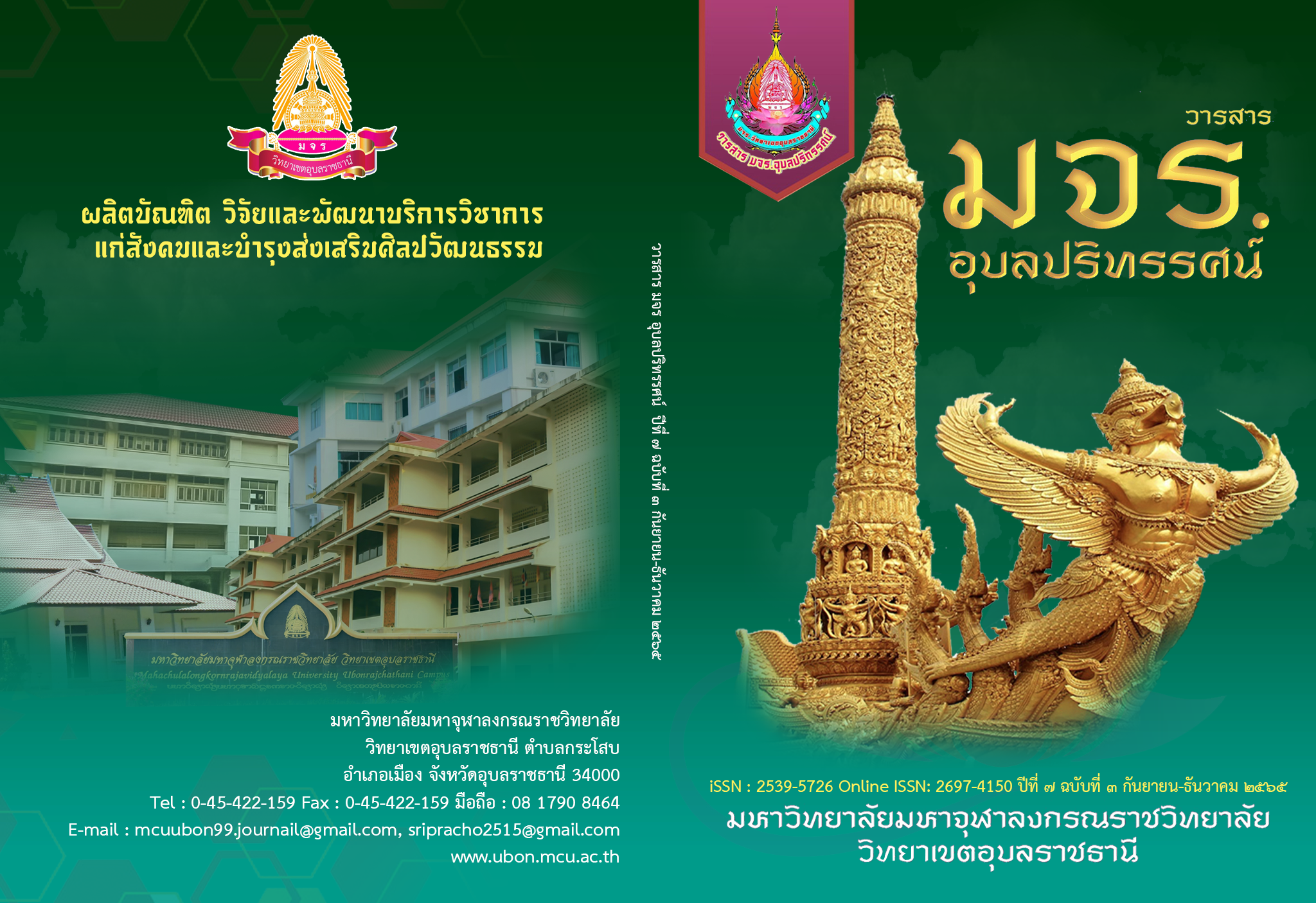LEARNING MANAGEMENT COMPETENCIES OF SOCIAL STUDIES TEACHERS IN THE 21st CENTURY
Main Article Content
Abstract
The patterns of learning management vary from the past to present time. The format of learning management is vital to promote the learners to cultivate their entire capacities. The lucid and appropriate pattern of learning management helps learners acquire their learning and cultivate the self-development. The current learning management has been influenced by various sciences and the advanced information technology. The learning nature of learners is sensitive to information and change. Social Studies teachers therefore change their mindsets, adjust their ways of instruction and assess their learning continually in order to respond to the development of educational quality in the era of learners’ competence competition. The objective of this article is aimed to propose concepts and guidelines for develop the competence of Social Studies teachers’ learning management in the 21st century. The teachers’ newly patterns of Social Studies learning management are introduced in order to cultivate learners of deep learning and worth of learning in regard to intellectual behaviors, thoughts, and capacities to think effectively. The following learning management competencies and Buddhist teaching method are the salient guidelines for Social Studies learning management in the 21st century are as follows: 1) 4Cs skills, 2) C-Teacher skills, and 3) The integration of Buddhist teaching method and teaching of Social Studies.
Article Details
References
กนก จันทร์ทอง.(2560). การสอนสังคมศึกษาในศตวรรษที่ 21.วารสารวิทยบริการ
มหาวิทยาลัยสงขลานครินทร์,ปีที่ 28 ฉบับที่ 2
กระทรวงศึกษาธิการ.(2552).หลักสูตรแกนกลางการศึกษาขั้นพื้นฐาน พุทธศักราช 2551.
กรุงเทพฯ : โรงพิมพ์องค์การรับส่งสินค้าและพัสดุภัณฑ์.
โชตรัศมิ์ จันทน์สุคนธ์.(2551).วิชาสังคมศึกษา : ศาสตร์แห่งการบูรณาการ.วารสารวิชาการ
ศึกษาศาสตร์, ปีที่ 9 ฉบับที่ 1 เดือนมกราคม - มิถุนายน 2551.
เฉลิมลาภ ทองอาจ. (2555). ก้าวสู่ศตวรรษที่ 21: เส้นชัยที่การศึกษาไทยยังไปไม่ถึง. วารสาร
ครุศาสตร์ จุฬาลงกรณ์มหาวิทยาลัย. ปีที่ 40 ฉบับที่ 1.
ถนอมพร เลาหจรัสแสง.(2556).การเรียนรู้ในยุคสมัยหน้า : ตอนอนาคตครูไทย ครูพันธุ์ C.
เชียงใหม่ : สถานบริการเทคโนโลยีสารสนเทศ มหาวิทยาลัยเชียงใหม่.
บรรยวัสถ์ ฝางคำ. (2563).พุทธวิธีการสอน. อุบลราชธานี : วิทยาการพิมพ์.
วัชระ จตุพร. (2561).โรงเรียนทางเลือกกับการจัดการเรียนรู้สําหรับผู้เรียนแห่งศตวรรษาที่ 21.
วารสารศึกษาศาสตร มหาวิทยาลัยขอนแก่น,ปีที่ 41 ฉบับที่ 2 เม.ย.-มิ.ย. 2561.
วิภาพรรณ พินลา.(2561).การจัดการเรียนรู้สังคมศึกษาเพื่อพัฒนาผู้เรียนด้านความ
รับผิดชอบต่อสังคม. Veridian E-Journal, Silpakorn University ฉบับ
ภาษาไทย สาขามนุษยศาสตร์ สังคมศาสตร์ และศิลปะ, ปีที่ 11 ฉบับที่ 1 เดือน
มกราคม-เมษายน 2561.
สำนักงานคณะกรรมการการศึกษาแห่งชาติ. (2542).พระราชบัญญัติการศึกษาแห่งชาติ
พ.ศ.2542. กรุงเทพฯ : สำนักงานคณะกรรมการการศึกษาแห่งชาติ.
สำนักวิชาการและมาตรฐานการศึกษา,กระทรวงศึกษาธิการ.(2551).ตัวชี้วัดและสาระการ
เรียนรู้แกนกลางกลุ่มสาระการเรียนรู้สังคมศึกษา ศาสนา และวัฒนธรรมตาม
หลักสูตรแกนกลางการศึกษาขั้นพื้นฐานพุทธศักราช 2551. กรุงเทพฯ : โรงพิมพ์
องค์การรับส่งสินค้าและพัสดุภัณฑ์.
สํานักส่งเสริมวิชาการและงานทะเบียน มหาวิทยาลัยราชภัฏวไลยอลงกรณ์ในพระบรม
ราชูปถัมภ์ จังหวัดปทุมธานี. (2557).คู่มือการจัดระบบการเรียนการสอนที่เน้น
ผู้เรียนระดับอุดมศึกษาเป็นสำคัญ. ปทุมธานี : สํานักส่งเสริมวิชาการและงาน
ทะเบียน.
National Education Association (NEA). (2010). Preparing 21st century students
for a global society: An educator’s guide to the “four Cs.” .
http://www.nea.org/assets/docs/A-Guideto-Four-Cs.pdf
Partnership for 21st Century Skills-P21. (2011). Framework for 21st Century
Learning. Online, http://www.p21.org.
Yeager, Elizabeth Anne.(2000). Thoughts on Wise Practice in the Teaching of
Social Studies, Social Education. 646; October, 2000.


